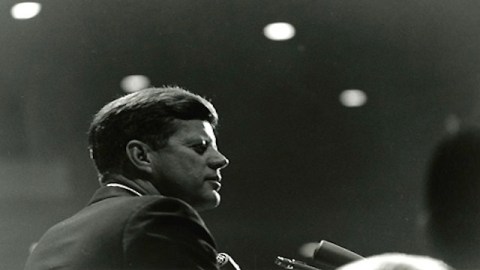A READING On Revolution: PRESIDENT KENNEDY’s FIRST INAUGURAL ADDRESS

What do we think about when we hear the word “revolution” today? The Beatles? Tahrir Square? The word has a rich history in political rhetoric, and in particular in political speeches—primarily those given by the revolutionaries in the time of revolution. Yet as America watches events that certainly look like what we think about when we think about revolutions, both here and abroad, let’s remember the time an American President spoke about the revolution most central to our patriotic psyche: our own. The New Yorker this week gave news of that magical speech, one many of us know almost by heart: John F. Kennedy’s First Inaugural Address.
Here is the paragraph containing a reference to a “revolution:”
The world is very different now. For man holds in his mortal hands the power to abolish all forms of human poverty and all forms of human life. And yet the same revolutionary beliefs for which our forbears fought are still at issue around the globe—the belief that the rights of man come not from the generosity of the state, but from the hand of God.
We dare not forget today that we are the heirs of that first revolution. Let the word go forth from this time and place, to friend and foe alike, that the torch has been passed to a new generation of Americans—born in this century, tempered by war, disciplined by a hard and bitter peace, proud of our ancient heritage—and unwilling to witness or permit the slow undoing of those human rights to which this Nation has always been committed, and to which we are committed today at home and around the world.
The New Yorker piece was written by Adam Frankel, one of President Obama’s speechwriters who also formerly worked for Ted Sorenson. Sorenson was more than JFK’s close advisor; he was the speechwriter commonly credited with not only having written parts of the Pulitzer Prize-winning “Profiles in Courage,” but also for having written drafts of this Address, also known as the Ask Not Speech. As Frankel explains in the article, he discovered a previously unearthed draft of this speech at the house of one of Sorenson’s former secretaries, named Gloria Sittrin. This new draft ultimately made its way to our current White House and our current President:
After lunch, I asked the Sitrins if I could make a copy of the draft. I took it upstairs, thinking that the President might be interested in seeing it. He was standing in the outer Oval Office when I entered. I handed him the draft, explaining how Sorensen had torn up the first one, and how Sitrin had kept this one in a box for fifty years.
“This is unbelievable,” he said, sitting down with it in a chair by his secretary’s desk. He then went downstairs to meet Gloria Sitrin. “Hello, Mr. President,” she said, a phrase she hadn’t uttered in fifty years.
The anecdote is an elegant echo of the image so widely reproduced of young Bill Clinton shaking JFK’s hand. While different, these three men—Kennedy, Clinton and Obama—share more than a love of history; they share a love for language. Yet while each in his time confronted the specter of a foreign “revolution,” only Kennedy took the word back. And by tying the idea of “revolutionaries” to “us,” he tied his audience not only to their history, but to their feelings. We are all revolutionaries, now. He made us want more. He assured us that we—and our country—were worth it.




